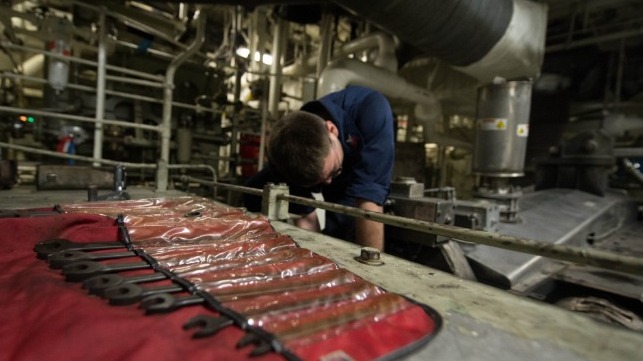Freedom-Class Littoral Combat Ships May Have Serious Gearbox Defect

When legislators recently decided to make the U.S. Navy test its next warship's propulsion system on land, they had the problematic history of the Littoral Combat Ship (LCS) program in mind. In a statement first reported by Defense News, the Navy acknowledged that it is investigating a significant drivetrain problem aboard the Freedom-class LCS, which has suffered multiple engineering casualties over a 12-year history in service.
The Freedom-class LCS - a completely different vessel from the Independence-class LCS, an aluminum-hulled trimaran built by a different yard - has repeatedly experienced problems with its combining gears. The engineering plant for the Freedom-class has two parallel CODAG (combined diesel and gas) propulsion systems powering four waterjets. The ship's two combining gears (port and starboard) each combine the input of one diesel engine and one gas turbine - allowing the ship to run economically on its diesels alone, more quickly on turbines alone, or very quickly on both diesels and both turbines at the same time. With a maximum total power of about 115,000 hp (85 MW), this arrangement propels the vessel ahead at speeds of up to 40 knots.
Unfortunately, the Freedom-class CODAG system has encountered issues with reliability. In 2013, the first-in-class USS Freedom sustained three mechanical breakdowns on a transit to Singapore, then several more during her deployment. Modifications were later made to her combining gears in order to "improve maintainability," and the same changes were made for the following vessels in the class.
In 2015, the USS Milwaukee sustained a combining gear failure due to clutch slippage while under way in the Atlantic, one month after she was delivered.
In a 2016 casualty aboard the LCS USS Fort Worth, the engineering crew started up the engines during a dockside test without turning on the lube oil feed for the combining gears, wiping the bearings on both the port and starboard units. The damage stranded the vessel in Singapore for six months.
In November 2020, the Freedom-class LCS USS Detroit sustained a propulsion casualty related to her combining gears while under way. She opted to limp back to her home port at Naval Station Mayport, but during the transit, she lost electrical power as well. A commercial offshore tug took her in tow and brought her to a port of refuge.
After these repeated issues, the U.S. Navy launched a root cause investigation with the gearbox OEM and with Lockheed Martin, the vessel's designer. The results suggest a class-wide problem related to "high speed clutch bearings failing prematurely," the service told Defense News.
“The government is investigating a material defect with the combining gear of USS Detroit and USS Little Rock, both Freedom-variant littoral combat ships,” Naval Sea Systems Command told Defense News in a statement. “Based upon preliminary assessments, the defect appears to be a design issue that will need to be addressed across the Freedom class. The Navy is taking the final steps to verify this as part of the root cause analysis of the combining gear failures. While this is in progress, measures have been implemented to mitigate risk to all the in-service Freedom variant ships.”

that matters most
Get the latest maritime news delivered to your inbox daily.
The first two Freedom-class ships (USS Freedom and USS Fort Worth) are being decommissioned next year as a cost-saving measure. Eight more are currently in service; five newbuilds are in various phases of construction and outfitting, and one additional hull is on order.
Due to concerns about their survivability and lethality in combat, procurement plans for both LCS classes have been truncated, and the Fincantieri-designed FFG(X) class frigate is replacing both in future production.
